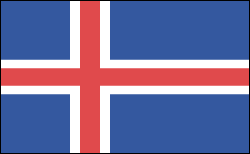Iceland History


Iceland Hit Hard by Financial Crisis
The country joined the North Atlantic Treaty Organization in 1949 and subsequently received an American air force base in 1951. In 1970, it was admitted to the European Free Trade Association. Iceland unilaterally extended its territorial fishing limit from 3 to 200 nautical miles in 1972, precipitating a dispute with the UK known as the “cod wars,” which ended in 1976 when the UK recognized the new limits. In 1980, the Icelanders elected a woman to the office of the presidency, the first elected female chief of state (i.e., president as distinct from prime minister) in the world. After the recession of the early 1990s, Iceland's economy rebounded.
At the International Whaling Commission meeting in July 2001, Iceland refused to agree to the continuation of the moratorium on commercial whaling that had been in effect since 1986. In 2003, after a 14-year lull, the country began hunting whales for scientific research.
In May 2003, David Oddsson was reelected, making him the longest-serving prime minister in Europe. In 2004, in a prearranged agreement made between the two parties of the coalition government, Oddsson and Foreign Minister Halldór Ásgrímsson switched positions. In June 2006 Ásgrímsson resigned as prime minister after his party did badly in local elections. Economic troubles were cited as the main reason for the Progressive Party's poor showing. Geir Haarde, leader of Iceland's largest political party, the Independence Party, became prime minister and announced the implementation of more fiscally conservative measures.
On October 9, 2008, amidst international stock market turmoil, the Icelandic stock exchange suspended trading and the government decided to nationalize three major banks. In November 2008, the IMF extended a $2 billion rescue package to Iceland to help its battered currency and stock market. Despite the aid, the financial crisis continued into 2009, prompting demonstrations against the government. Prime Minister Geir Haarde resigned on January 26, 2009, causing the collapse of Iceland's government. On February 1, 2009, Johanna Sigurdardottir was sworn in as the new prime minister, becoming Iceland's first female prime minister and the modern world's first openly gay head of government. In April parliamentary elections, Sigurdardottir's center-left coalition won 34 out of 63 seats.
In a March 2010 referendum, voters in a landslide rejected the government's proposal to reimburse Britain and the Netherlands for $5 billion in losses incurred in the collapse of Landsbanki in 2008.







